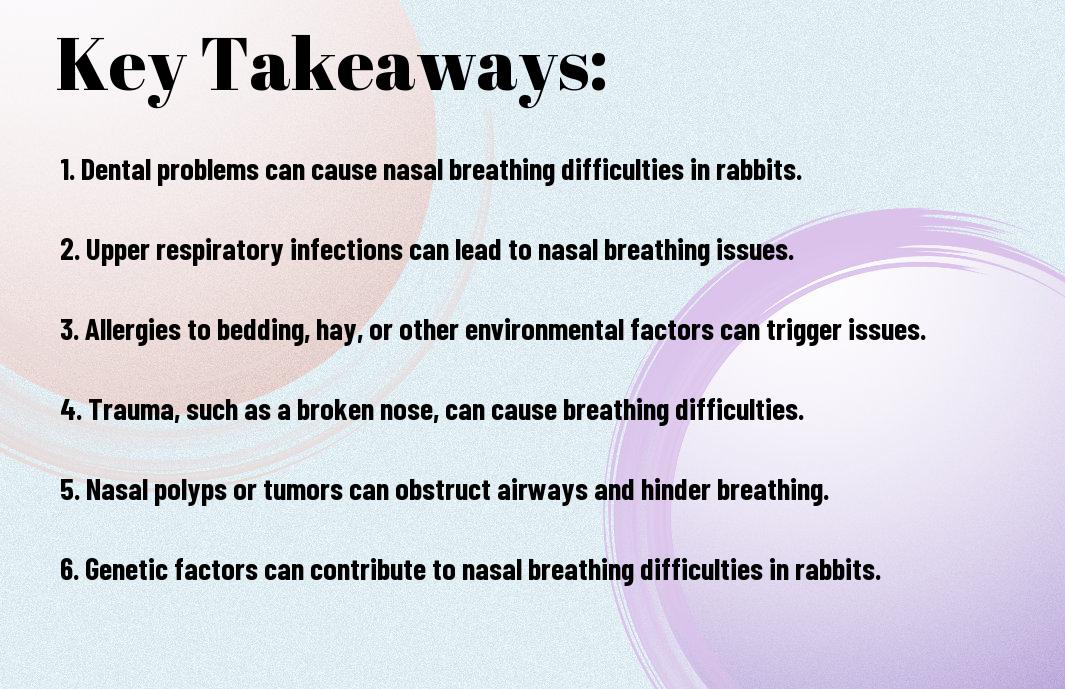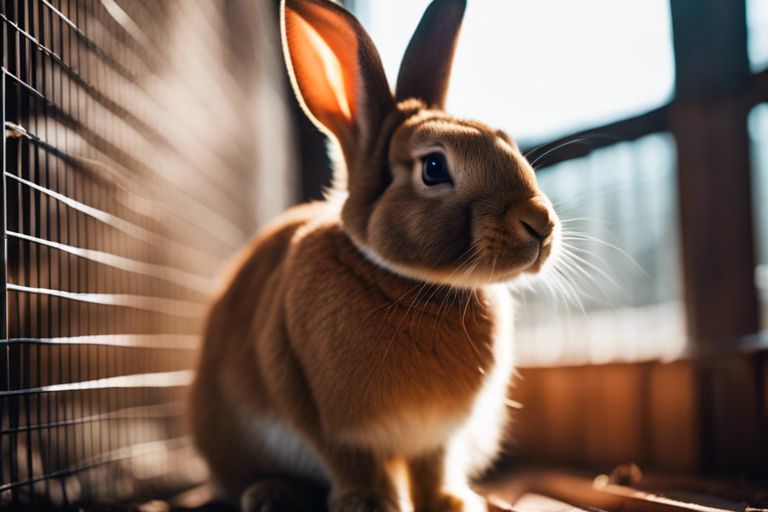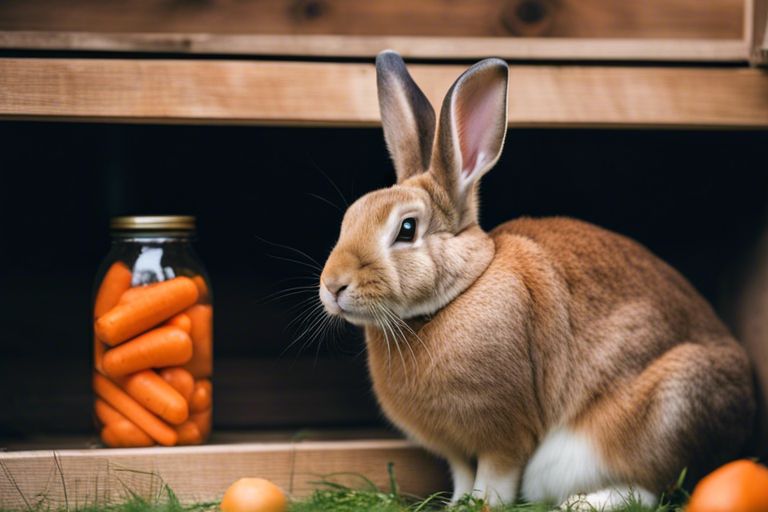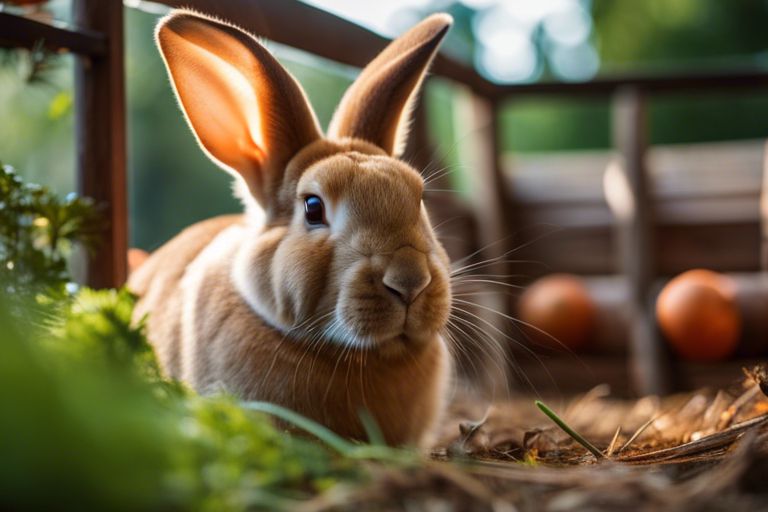Have you ever noticed your Flemish Giant rabbit struggling to breathe through its nose? Chronic nose breathing difficulties in these gentle giants can be caused by a variety of factors, and it’s important to be aware of the potential causes in order to prevent serious health complications. In this informative blog post, we will discuss the most common reasons why Flemish Giant rabbits may experience difficulties with nose breathing, and what steps you can take to help your furry friend breathe easier.
Key Takeaways:
- Dental problems: Overgrown teeth can obstruct the nasal passage, causing breathing difficulties in Flemish Giant rabbits.
- Respiratory infections: Bacterial or viral infections can lead to inflammation and congestion in the nasal passages, making it hard for rabbits to breathe through their noses.
- Allergies: Allergens such as dust, pollen, or certain foods can trigger allergic reactions in rabbits, leading to nasal congestion and difficulty breathing.
- Obesity: Excessive weight can put pressure on the respiratory system, making it difficult for rabbits to breathe through their noses.
- Nasal tumors: Tumors in the nasal cavity can physically obstruct the airway, causing breathing difficulties in Flemish Giant rabbits.


Anatomy and Physiology of Flemish Giant Rabbit Nasal Passages
Assuming you are a proud owner of a Flemish Giant rabbit, it is essential to understand the unique anatomy and physiology of their nasal passages. These features play a crucial role in your rabbit’s ability to breathe and can impact their overall health and well-being.
Comparative Size and Structure Considerations
When comparing the nasal passages of Flemish Giant rabbits to smaller breeds, you will notice significant differences in size and structure. The nasal passages of a Flemish Giant are much larger and more spacious compared to smaller breeds. This allows for a more efficient airflow, but it also means that there is an increased risk of blockages and other respiratory issues. You should be mindful of this when monitoring your rabbit’s breathing and respiratory health.
| Feature | Impact |
| Nasal Passage Size | Efficient airflow but increased risk of blockages |
| Nasal Passage Structure | More spacious design |
The Role of Nasal Passages in Rabbit Respiration
The nasal passages play a crucial role in your rabbit’s respiration. They serve as the entry point for air into the respiratory system, allowing for the exchange of oxygen and carbon dioxide. Additionally, the nasal passages help filter and humidify the air, ensuring that your rabbit’s respiratory system functions optimally. Any issues with the nasal passages can significantly impact your rabbit’s ability to breathe and can lead to potentially serious health concerns. It is essential to monitor your rabbit’s nasal passages closely and seek veterinary attention if you notice any signs of breathing difficulties.
Common Causes of Breathing Difficulties in Flemish Giants
Lastly, you may wonder what the common causes of breathing difficulties in Flemish Giant rabbits are. According to Respiratory problems in rabbits, the most common causes of breathing difficulties in rabbits are allergies and environmental factors, infectious diseases and parasites, and genetic predisposition.
Allergies and Environmental Factors
One of the potential causes of breathing difficulties in Flemish Giant rabbits is allergies and environmental factors. Your rabbit may be sensitive to dust, pollen, or certain bedding materials, which can lead to respiratory issues. Other environmental factors such as poor ventilation in your rabbit’s living environment can also contribute to breathing difficulties. This can manifest as coughing, wheezing, or nasal discharge. If you suspect that your rabbit may be experiencing allergies or environmental sensitivities, it’s essential to address these factors to alleviate their breathing difficulties.
- Dust, pollen, or certain bedding materials
- Poor ventilation
This can lead to coughing, wheezing, or nasal discharge. This can impact the overall well-being of your rabbit, so it’s crucial to address these factors to ensure their respiratory health.
Infectious Diseases and Parasites
Another potential cause of breathing difficulties in Flemish Giant rabbits is infectious diseases and parasites. Your rabbit may be susceptible to respiratory infections such as pasteurellosis or snuffles. Additionally, parasites such as mites and worms can also affect your rabbit’s respiratory system and lead to breathing problems. It’s essential to monitor your rabbit for any signs of respiratory distress and consult with a veterinarian if you suspect they may be affected by infectious diseases or parasites.
Non-Infectious Factors Affecting Nasal Breathing
To understand the causes of nasal breathing difficulties in Flemish Giant rabbits, it’s important to consider the non-infectious factors that can affect their ability to breathe through their nose. Here are some non-infectious factors that may contribute to nasal breathing difficulties in your Flemish Giant rabbit:
- Anatomical Deformities: Certain anatomical deformities such as narrow nasal passages or abnormally shaped nasal bones can impede your rabbit’s ability to breathe through its nose.
- Obesity and Diet-Related Issues: Just like in humans, obesity in rabbits can lead to respiratory issues that may affect their ability to breathe through their nose. Similarly, a poor diet that lacks essential nutrients can also contribute to nasal breathing difficulties.
This understanding of non-infectious factors can help you identify potential causes of nasal breathing difficulties in your Flemish Giant rabbit.
Anatomical Deformities
Anatomical deformities such as narrow nasal passages or abnormally shaped nasal bones can significantly impact your rabbit’s ability to breathe through its nose. These deformities can restrict the airflow, leading to nasal breathing difficulties. It is important to consult a veterinarian if you suspect that your rabbit may have anatomical deformities affecting its nasal breathing.
Obesity and Diet-Related Issues
Obesity and diet-related issues can also contribute to nasal breathing difficulties in Flemish Giant rabbits. Excessive weight can put pressure on the respiratory system, making it harder for your rabbit to breathe through its nose. Ensure that your rabbit maintains a healthy weight and receives a balanced diet to reduce the risk of diet-related nasal breathing issues.

Diagnosis and Management
However, if you suspect your Flemish Giant rabbit is experiencing nose breathing difficulties, it is important to seek veterinary care as soon as possible. A veterinarian can help you diagnose the underlying cause of the issue and provide appropriate treatment to alleviate your rabbit’s discomfort.
Veterinary Diagnostic Approaches
When you take your rabbit to the veterinarian, they will likely conduct a thorough physical examination to assess your rabbit’s overall health. In addition, they may recommend diagnostic tests such as X-rays, CT scans, or endoscopy to get a closer look at the nasal passages and identify any obstructions, infections, or abnormalities. These diagnostic approaches will help the veterinarian determine the root cause of your rabbit’s nose breathing difficulties.
Treatment Options and Preventative Care
Once the veterinarian has identified the underlying cause of your rabbit’s nose breathing difficulties, they can recommend appropriate treatment options. This may include medication to address infections or inflammation, surgical intervention to remove obstructions or correct structural issues, or environmental modifications to prevent further respiratory issues. Additionally, your veterinarian can provide guidance on preventative care to help minimize the risk of future nose breathing difficulties in your Flemish Giant rabbit. It is important to follow your veterinarian’s recommendations closely to ensure the best possible outcome for your rabbit’s health.
FAQ
Q: What are the common causes of nose breathing difficulties in Flemish Giant rabbits?
A: Nose breathing difficulties in Flemish Giant rabbits can be caused by dental problems, upper respiratory infections, allergies, and environmental irritants. It is important to monitor your rabbit’s breathing and seek veterinary attention if you notice any signs of difficulty.
Q: How do dental problems lead to nose breathing difficulties in Flemish Giant rabbits?
A: Dental problems such as overgrown teeth or abscesses can cause nasal blockages and interfere with a rabbit’s ability to breathe through its nose. The roots of a rabbit’s teeth extend close to the nasal passages, making them susceptible to causing breathing issues when they are not properly aligned or maintained.
Q: What steps can be taken to prevent nose breathing difficulties in Flemish Giant rabbits?
A: Regular veterinary check-ups, proper dental care, and maintaining a clean and dust-free environment are crucial in preventing nose breathing difficulties in Flemish Giant rabbits. Additionally, feeding a high-quality diet and providing ample opportunities for exercise can help keep your rabbit healthy and lessen the likelihood of respiratory issues.
